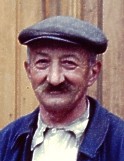Auguste Berne
Marie Joseph Auguste Berne was born in Fèves on September 26, 1887, the son of Cyprian Berne and Philomene Marie (Barthelemy) Berne. His future wife, Marie Jeanne Robert Floze, was also born in Fèves, on January 21, 1880, the daughter of Justin Robert Floze and Henriette Floze. The couple was married in Fèves on April 21, 1912. Berne persued the vocation of farmer.
To this union, four children were born: Louis Auguste, Clément, Marie Gabrielle - the mother of aid-recipients Marc Davoli and
Ginette Davoli - and Henri. All were born in Fèves.
Until the conclusion of the First World War, Lorraine was part of Germany. As part of the agreement that ended the war,
Lorraine was returned to France.
Auguste Berne, Fèves mayor from 1945 until his death.
In 1925, Berne was elected to the Fèves city council. He held that position until Lorraine was again annexed to Germany in July 1940.
He and most of the other citizens were then expelled and sent to the southwestern part of France under the nominal control of the
Vichy government headed by Marshal Philippe Pétain. These former residents of Lorraine lived in or near the village of Lavaur in
the Tarn District east of Toulouse.
In 1945, some months after Fèves was liberated, most of its displaced citizens returned to their former home in Lorraine. Berne
was elected mayor.
Late in 1948, after Morganville chose Fèves as its sister city and presented a pageant to raise money, the village began shipping
items to the French village. The Fèves community established a committee to handle their relationship with her
American sister. The three committee members were schoolmaster Henri Torlotting, village priest Louis Holveck and Mayor Auguste
Berne.
Todd visited Fèves late that same year and met with the committee members. In a December 8, 1948 letter to Velma Carson written
from Geneva, Switzerland, Todd wrote of Berne:
August Berne, Le Maire. He is exactly what a French Mayor should be, but don’t count on too much from him beyond good will. Here again, you can refer to my drinking habits, and assure him that his Mirabelle was the best I ever had. (I realize my comments are making it impossible to show my letters to fellow Kansans, but one obviously can't drink French water.)
Todd's comments may need some clarification for an American. Unlike many mayors in the United States, French mayors tend to be
nonpartisan representatives of the community as a whole. As a result, they remain above conflict. Consequently, decisions are
typically taken by others assigned such tasks.
The later sentences in the quote refer to the potent plum brandy made in the region - a product of some substantial local pride.
Since Kansas was a "dry" state in 1948 - meaning the drinking of alcohol was illegal - Todd was suggesting that his drinking might
not be appreciated in Kansas.
Auguste Berne died from a heart attack on November 28, 1951. How he was regarded by the townspeople can be seen in the following
words from his death announcement:
He was very popular. The deceased was sympathetically known and esteemed in the village and surrounding territory. He loved his
native land and left taking the regards of those to whom he ministered. All were his friends.
Emile Pierson, Berne's primary deputy, then became mayor until the next election.


